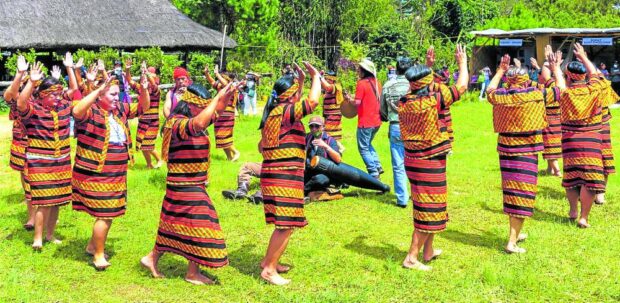
CULTURAL DISPLAY | Baguio City should have been the ancestral domain of its original Ibaloy settlers, their descendants shown in this cultural event in 2022, until they were displaced when the American colonial government built the summer capital in the early 1900s. The only Ibaloy domain recognized by the government is at Barangay Happy Hallow inside the Camp John Hay reservation. (Photo by NEIL CLARK ONGCHANGCO / Inquirer Northern Luzon)
BAGUIO CITY, Benguet, Philippines — All ancestral land titles in Baguio City that have not been contested by the government are as valid as modern land titles, according to Justice Secretary Jesus Crispin Remulla in a 2022 legal opinion that was recently uncovered by the city council.
Because of Remulla’s conclusions, the council on Monday passed a resolution directing city government officials to honor certificates of ancestral land title (CALTs) and the communal certificate of ancestral domain title (CADT) inside Camp John Hay in all government transactions, such as building permit applications.
Baguio CALT owners have not been able to secure building permits because the National Building Code (Presidential Decree No. 1098) only recognizes original certificates of title (OCTs) and transfer certificates of title (TCTs) as proof of ownership.
As a result, many Ibaloy homes have been constructed on CALT and CADT lands without building permits, said Councilor Michael Lawana, an Ibaloy and president of the Liga ng mga Barangay.
The OCT or TCT is issued by the Department of Environment and Natural Resources and is documented in the local register of deeds.
CALTs are issued by the National Commission on Indigenous Peoples (NCIP) to recognize individual Ibaloy home lots, where indigenous families have lived “since time immemorial.” CADTs refer to communally protected ancestral lands.
Baguio’s only CADT is located at Barangay Happy Hallow inside the Camp John Hay forest reserve.
According to Vice Mayor Faustino Olowan, this legal hurdle over CALTs and CADTs shows how indigenous Filipinos still suffer discrimination despite protections guaranteed by the 1987 Constitution and the 1997 Indigenous Peoples Rights Act.
By treating CALTs as second-class tenurial instruments, the government continues to deprive Ibaloys of better economic opportunities, Olowan said.
Legal inquiry
Councilor Maximo Edwin (who also uses the Ibaloy clan surname Bugnay) sponsored the resolution after discovering Remulla’s Dec. 15, 2022, opinion on the Department of Justice (DOJ) website.
Remulla addressed a legal inquiry posed last year by Public Works Secretary Manuel Bonoan as to whether CALT and CADT have the same entitlements as regular land titles, at the request of Johnny Degay, the city’s building officer.
Degay, who attended the session, said he needed to find out whether ancestral land titles could substitute for TCTs so he could issue permits covering CALT and CADT properties. He said his office also needed to determine if this action was legal given that it “is in conflict with the National Building Code.”
In his opinion, Remulla said the DOJ would normally refrain from rendering opinions on issues it might have to prosecute in court. But he pointed out that Presidential Decree No. 1096 took effect before Indigenous Peoples’ Rights Act (Ipra)became law, so guided by “the spirit rather than the letter of that law … CALT and CADT may be submitted with the building official in lieu of an OCT or a TCT for the purpose of procuring a building permit.”
The justice secretary said: “Since the CADT and CALT are considered as recognition of ownership, a building permit may be issued on structures built on parcels of land covered by the CADT or CALT that were not nullified through a judicial proceeding.”
He took note of the 2019 Supreme Court ruling that nullified 36 Baguio CALTs issued over a park and lands encroaching on the presidential Mansion. The high court said the CALTs were issued within the Baguio townsite reservation, which is exempt from the NCIP jurisdiction. It also said Congress, not the NCIP, had the sole authority to reclassify townsite properties into ancestral lands.
Councilor Betty Lourdes Tabanda, a lawyer, said the council must study the resolution’s impact on “derivative titles,” or subdivided CALT lots, which could be sold to outsiders or people who are not members of the IP community. Ipra safeguards ancestral lands for future generations, she said, but easing restrictions over CALT lots “means we may soon have no more Ibaloy lands.”
Remulla made the same observation in his opinion, urging the government to take a “judicious approach” to CALT and CADT matters. He cited a 2021 Supreme Court decision that describes CALT and CADT as sui generis (a class by itself), meaning IP lands “cannot be alienated (sold) or encumbered except to the State and in ways that would prevent future generations of the group from using and enjoying it.”
NCIP Cordillera legal officer Arthur Herman told the council that Baguio itself should have been the ancestral domain of the original Ibaloy settlers, had they not been displaced when the American colonial government built the summer capital in the early 1900s.